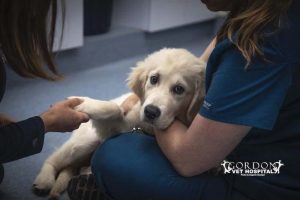Keep your pet comfortable this Winter
By John Morgan | Dated May 12, 2025 | 0 Comments
Can you believe it’s al […]
By Helen Burns | Dated March 29, 2021
Did you know that prior to the 1970s, canine parvovirus was not a disease risk for dogs? In fact, canine parvovirus mutated from a cat virus in 1978, and since then has been a major threat to the health of puppies all over the world. Although parvoviruses affect most mammals, each species tends to have its own parvovirus, which doesn’t infect any other species.
These particularly small and robust viruses are extremely effective at survival, and can remain infective in the environment for many months. This enables the virus to infect puppies both by direct contact with an infected dog, and by contact with virus particles contained in faeces in the environment.
Once a puppy ingests the virus, it travels throughout the body, targeting rapidly dividing cells. Its main focus are the cells lining the intestine and the white blood cells, which leads to severe bloody diarrhoea and profoundly low white blood cell counts. Puppies tend to present to the vet 4-14 days after exposure to parvovirus, with signs of severe illness, with depression, anorexia, vomiting and bloody diarrhoea. Untreated, the mortality rate is about 70%, however with treatment which includes intravenous fluids, antibiotics for secondary bacterial sepsis, medication for nausea and nutritional support, the survival rate can reach 90%.
Prevention is of course better than a cure, and the parvovirus vaccine is one of the core vaccines given to puppies, at 6-8 weeks of age, 10-12 weeks of age and at 16 weeks.
You may wonder why it is that we give puppies 3 vaccines (all of which contain the parvovirus vaccine), at 6-8 weeks of age, 10-12 weeks, and again at 16 weeks old. For a puppy to form an immune response to a vaccine, they mustn’t have significant antibodies already, because those antibodies just destroy the vaccine as though it is a real infection. Now puppies obtain antibodies from the mother’s milk, called colostrum on the day of their birth. These antibodies help to protect the puppy from parvovirus, among other infections, until they have waned to such a low level that they are no longer effective. If puppies are vaccinated whilst they have high numbers of antibodies from their mother, then their response to the vaccine won’t be sufficient. We know that these maternal antibodies drop in number over time, and at different rates in different puppies. Even in the one litter, the puppy who was born first and fed first may have a higher antibody level that lasts longer, than the pup born last. We do know, however that the vast majority of puppies will not have significant maternal antibodies at 16 weeks of age. This is one of the reasons that puppies are given the 3 vaccines, with the last one at 16 weeks of age. We aim to catch them as soon as possible after the immunity from their mother has waned, so that they can develop their own strong immunity to this devastating virus.
